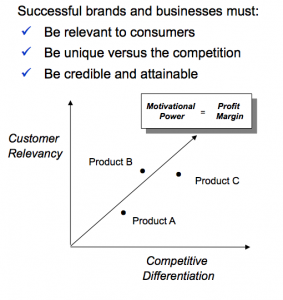Brand Positioning Strategy
Brand positioning is defined as the conceptual place you want to own in the target consumer’s mind — the benefits you want them to think of when they think of your brand. An effective brand positioning strategy will maximize customer relevancy and competitive distinctiveness, in maximizing brand value.
In defining a brand’s positioning, it’s useful to think of the following four key components of a positioning statement:
 Category frame of reference: What is the competitive context? With which product category should the brand be associated?
Category frame of reference: What is the competitive context? With which product category should the brand be associated?- Definition of target market(s): Who is the brand being built for (i.e. the center of the targeting bulls-eye.) Learn more here.
- Statement of the key point of difference: What benefits should the brand stand for and deliver on?
- Reason(s) to believe: What proof points need to be demonstrated?
In crafting a brand positioning statement, consider the following strategic positioning framework:
To (target audience) Product X is the only (frame of reference) that (benefits delivered) because (reasons to believe)
You can use this positioning template which includes a proven positioning framework to ensure discipline in making these important choices.
Brand Positioning Strategy Objectives
 Relevance is priority #1. Customers must find the brand appealing. If not, the brand won’t make it into the consideration set, regardless of how differentiated or credible it is.
Relevance is priority #1. Customers must find the brand appealing. If not, the brand won’t make it into the consideration set, regardless of how differentiated or credible it is.- Differentiation is critical and the key driver of positioning success. The brand must be unique vs. competitive offerings.
- Credible and attainable is the final measure. If you cannot credibly provide the offering, the customer is left with an empty promise.
It’s critically important when developing a brand positioning strategy to deliver on all three positioning objectives at the same time. This is because brands that are highly relevant though not differentiated run the risk of being commoditized. Similarly, brands that are highly differentiated, though not particularly relevant, become niche providers. The best positioning statements deliver ensure relevance, distinctiveness, and sustainability.
Practically speaking, concept optimization research is a great way to develop and evaluate alternative positioning concepts, as demonstrated here.
To learn more about EquiBrand’s brand positioning services, call Tim Koelzer at 925-235-9556 or fill out a contact form.

 Relevance is priority #1. Customers must find the brand appealing. If not, the brand won’t make it into the consideration set, regardless of how differentiated or credible it is.
Relevance is priority #1. Customers must find the brand appealing. If not, the brand won’t make it into the consideration set, regardless of how differentiated or credible it is.















Follow EquiBrand